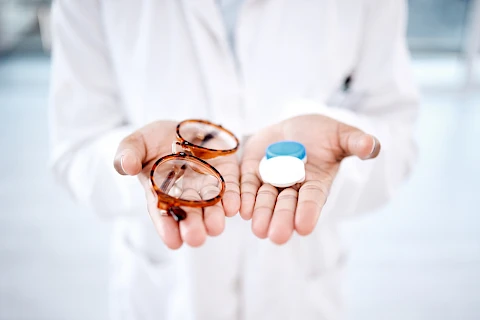
Clear vision not only enhances our daily lives but also ensures our safety and independence. For seniors, taking care of eyeglasses and contact lenses is a part of preserving optimal vision. In this article, we'll share practical tips for keeping your eyewear in top condition. We'll cover the importance of regular cleaning, proper storage, and timely replacements. We'll also provide guidance on what to do if your eyeglasses or contact lenses become damaged or lost.
Importance of Regular Cleaning
Keeping your eyeglasses and contact lenses clean is crucial for clear vision and eye health. Dirty lenses can obstruct your vision and lead to eye strain.
Cleaning Eyeglasses
- Rinse your eyeglasses under lukewarm water to remove any dust or debris.
- Apply a small drop of dish soap to each lens and gently rub with your fingers.
- Rinse thoroughly with lukewarm water.
- Use a clean, lint-free cloth to dry your eyeglasses. Avoid using paper towels or tissues, as they can scratch the lenses.
Cleaning Contact Lenses
- Wash your hands thoroughly with soap and water before handling contact lenses.
- Remove one lens at a time and place it in the palm of your hand.
- Apply a few drops of contact lens solution and gently rub the lens with your fingertip for about 20 seconds.
- Rinse the lens with more solution and place it in a clean contact lens case filled with fresh solution.
- Repeat the process for the other lens.
Proper Storage Techniques
Correct storage of eyeglasses and contact lenses can prolong their lifespan and maintain their functionality. When not in use, always store them in a hard, protective case. Avoid placing them lens-side down on any surface to prevent scratches.
For contact lenses, store them in a clean case with fresh solution every day. Replace the contact lens case every three months to avoid bacteria buildup. Never store lenses in water or reuse old solutions.
Timely Replacements
Knowing when to replace your eyeglasses or contact lenses helps to maintain eye health and comfort. Signs that your eyewear needs replacing include scratches on eyeglass lenses that impair your vision, loose or bent eyeglass frames, discoloration or tears in contact lenses, and frequent discomfort or redness in your eyes when wearing contact lenses. For eyeglasses, it's generally recommended to replace them every 1 to 3 years or as prescribed by your eye doctor. Contact lenses should be replaced according to the schedule recommended by your eye doctor, which may be daily, bi-weekly, or monthly.
Handling Damage or Loss
Unexpected damage or loss of your eyewear can be challenging, but knowing what to do can save you from further stress. If your eyeglasses are damaged or broken, try to temporarily fix loose screws with a tiny screwdriver or use tape to secure broken frames until you can get professional help. Visit your optometrist to repair or replace your eyeglasses.
Help Seniors Care for Their Eyewear
Taking care of your eyeglasses and contact lenses is key to maintaining good eye health as you age. Remember to clean them regularly, store them properly, and replace them when necessary. These simple steps can greatly enhance your comfort and vision. Following these tips will help you keep your eyewear in top shape and ensure optimal eye health. If you need assistance with daily activities, don't hesitate to contact Senior Helpers Stamford. We proudly serve Fairfield County, Westport, Norwalk, Stamford, and Greenwich.